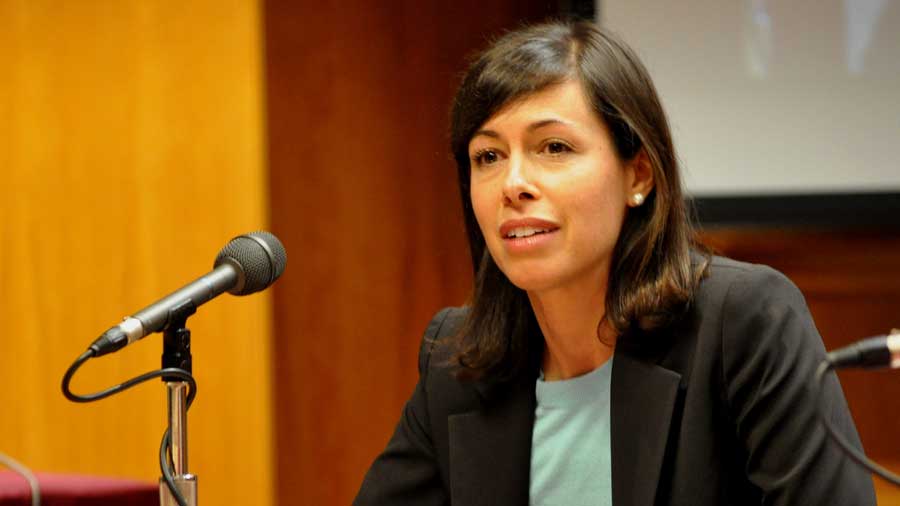FCC's Rosenworcel Takes Aim at Sinclair-Tribune

The smarter way to stay on top of broadcasting and cable industry. Sign up below
You are now subscribed
Your newsletter sign-up was successful
Democratic FCC Commissioner Jessica Rosenworcel used her first official remarks since returning to the commission to take aim at broadcast deregulation in general and the Sinclair-Tribune deal in particular, as well as to say the FCC should "go back to the drawing board" on ATSC 3.0.
Neither of those views, expressed in a speech to the U.S. Conference of Catholic Bishops Thursday (Oct. 12), were music to broadcasters ears, though it will be the Republican majority who will get the deciding votes if they stick together.
"For decades, at the direction of Congress, the Commission has maintained limits on the number of broadcast stations that a single company can own," Rosenworcel said. "These limits were designed to help sustain media diversity, localism, and competition."
She also took aim at the restoration of the UHF discount, which she had voted to eliminate, and the FCC's reversal of its advisory on how it would treat joint sales agreements when vetting license transfers. She said both had paved the way for the proposed deal. "I am concerned the Commission is gearing up to approve a transaction that will hand a single broadcast company the unprecedented ability to reach more than 70 percent of American households," she said, which was made possible by the return of the UHF discount under current chairman Ajit Pai.
She said allowing a "rush of new consolidation" was not the prescription for the ills for the industry.
Sinclair and other broadcasters say they need the scale to compete with MPVDS and OVDs, who do not have similar audience reach restrictions.
On another issue, Rosenworcel was also not on the same page with broadcasters when it came to the timetable for rolling out the new ATSC 3.0 transmission standard. While the National Association of Broadcasters this week urged the FCC to approve the voluntary rollout of the standard, saying that, too, was necessary for them to compete against MPVDs and OVDS, Rosenworcel said, effectively: Not so fast.
The smarter way to stay on top of broadcasting and cable industry. Sign up below
She said there was a lot to be excited about in the new standard, but said she feared the agency was about to "rush a standard" to market without understanding the consumer consequences. Pai has signaled he wanted to vote the final framework for rollout by year's end.
But Rosenworcel said that with the new standard being incompatible with current sets, the fact that it is voluntary means the cost will be added to consumer cable and satellite bills. Then there is the cost of a new set.
"This is not a great boon for consumers, it’s a tax on every household with a television," she said. "So it’s time for the Commission to go back to the drawing board and find a way to smooth the transition to this new standard in a way that better serves the public interest."
Rosenworcel's speech drew immediate response from both sides of the issues.
“Unfortunately, Commissioner Rosenworcel misunderstands the goals and asks of broadcasters," said NAB EVP Dennis Wharton. "We simply want to compete on equal footing with national wireless and pay TV providers who routinely upgrade services in the telecom ecosystem."
“NextGen TV will allow local TV stations – including our public TV brethren – the ability to offer ultra HDTV programming, emergency alerts that save lives, and live TV on mobile devices. This will be a free and local programming innovation that the FCC routinely supports, and that tens of millions of consumers will enjoy.”
On the other side was Michael Calabrese, director of the Wireless Future program at New America's Open Technology Institute.
“Along with Consumers Union, we likewise warned the FCC that unlike the 2009 DTV transition, broadcasters have proposed an ATSC 3.0 transition that could force consumers to choose between buying new equipment or losing access to local TV stations over the air," he told B&C/Multichannel News.
“Sinclair benefits more than anyone from FCC approval of ATSC 3.0 as proposed, thanks to patent royalties. That makes it even more troubling the FCC has been rushing this proceeding along without any transparency concerning the effective tax the ATSC transition will impose on most U.S. households.”
Contributing editor John Eggerton has been an editor and/or writer on media regulation, legislation and policy for over four decades, including covering the FCC, FTC, Congress, the major media trade associations, and the federal courts. In addition to Multichannel News and Broadcasting + Cable, his work has appeared in Radio World, TV Technology, TV Fax, This Week in Consumer Electronics, Variety and the Encyclopedia Britannica.

